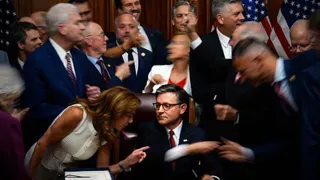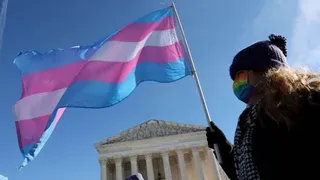March 10, 2008
Advocates turn out en masse for transgender civil rights bill
Michael Wood READ TIME: 7 MIN.
Supporters of a bill to add gender identity to state civil rights laws far outnumbered opponents at a marathon public hearing before the Joint Committee on the Judiciary at the State House on March 4. The committee listened to 10 hours of testimony on a host of bills related to same-sex marriage, abortion, victim's rights and other issues. But the bulk of the hearing, which lasted until 11:30 p.m., was devoted to H.B. 1722, the first major piece of transgender rights legislation to come before the Massachusetts Legislature.
The coalition supporting the bill, led by the Massachusetts Transgender Political Coalition and lead legislative sponsors Reps. Carl Sciortino (D-Medford) and Byron Rushing (D-Boston), pulled together an impressive array of supporters. Gov. Deval Patrick, Congressman Barney Frank and state Attorney General Martha Coakley all announced their support for H.B. 1722 through surrogates who presented their testimony to the committee. (See "Heavy hitters go to bat for transgender civil rights bill"). Other political heavyweights throwing their support behind the bill included Boston City Council President Maureen Feeney, Cambridge Mayor Denise Simmons, and Suffolk County Sheriff Andrea Cabral - all of whom offered their testimony in person - Boston Mayor Thomas Menino, whose LGBT liaison, Karen Salfity, presented his testimony to the committee and Northampton Mayor Clare Higgins, who submitted written testimony. Menino, Simmons and Higgins represent the three Massachusetts municipalities that already have trans-inclusive non-discrimination ordinances.
The Judiciary Committee has until March 19 to determine what course of action it will take on all of the bills before them, including H.B. 1722. Bill Conley, lobbyist for the Massachusetts Gay and Lesbian Political Caucus, one of the organizations working to pass the bill, said the committee has four options. They can vote that the bill ought to pass, which would send it to the House Committee on Steering, Policy and Scheduling. That committee could choose to place it on the calendar for a vote in the House, or it could send it to another committee.
Conley said the Judiciary could also vote that H.B. 1722 ought not to pass, which would effectively kill it for the year. The two remaining options include sending it to a study committee, which Conley says frequently but not always means the bill is dead, or vote for an extension, which would give the committee more time to deliberate on the bill.
"The lobby team is working with Judiciary leadership and the committee members one-on-one to address their concerns and make sure they have the information they need to make a good decision. ... It will be a while before we're sure of how it will proceed," said Conley.
Marc Solomon, campaign director for MassEquality, another organization working on H.B. 1722, said that the goal of the coalition is to pass the bill this year. Though it took about 16 years to pass the gay rights bill after contentious battles in the '70s and '80s, Solomon believes the transgender rights bill can move on a much faster track.
"It's not a matter at all of the Legislature taking a long time with this. It's on the shoulders of our community to make the case to their legislators about why this bill should move and move quickly, and ultimately that's what will make it happen," said Solomon.
The committee asked few questions during the hearing. The most substantive exchange took place during the testimony of a panel of attorneys supporting the legislation. Committee co-chair Rep. Eugene O'Flaherty (D-Chelsea) told the panel, which included representatives from Gay and Lesbian Advocates and Defenders (GLAD), the Mass. Bar Association, the Boston Bar Association, and the Women's Bar Association, that several people had privately expressed their concerns to him about the legislation, and he wanted the attorneys to address those concerns. "So I'm going to take some of those private conversations and I'm going to ask you some questions," he said.
He asked what recourse a woman would have if she was changing her child's diaper in a public restroom and "an individual enters into the women's bathroom, does not identify him or herself in any capacity, but it is, we'll say for the hypothetical, observable by the woman with the child that this is an individual that in her mind does not appear to be a woman."
GLAD attorney Jennifer Levi, one of the drafters of the legislation, said that if the individual entering the bathroom identifies as female, the proposed law would give her the right to use the restroom, regardless of whether other occupants believe that she is female.
"What this law does is ensure that individuals can safely and comfortably use the restroom that is consistent with their gender identity or expression. Everybody has to use bathrooms, and what this law will do is ensure that everyone can use those [bathrooms] with dignity and safety," said Levi. "It is true that there may be some people who think that they can perceive or accurately identify what another person's gender identity or expression is. That is not the case. It's not the case that you ever know who it is that's in the restroom with you."
She added that H.B. 1722 does not provide legal protections to people who enter a public bathroom to commit a crime.
O'Flaherty asked if there was any "substantive trigger" that would determine when a person changing their gender or considering changing their gender would be eligible to use the restroom of their choice.
"If I were to walk into a women's bathroom today, that would make the occupants, I imagine, of the women's bathroom very unhappy," said O'Flaherty.
Cathy Reuben, co-chair for the labor and employment section council of the Mass. Bar Association, said once the courts and the Massachusetts Commission Against Discrimination (MCAD) issue rulings related to the legislation, those rulings would provide guidance about how it should be implemented. She added that she believed the law left room for businesses with public bathrooms to set policies asking only those who identify as female to use the women's room.
O'Flaherty continued to press the panel on the question of bathrooms, asking whether the law would allow someone to use a restroom regardless of whether they had any physical attributes matching the bathroom's assigned gender. Levi answered that there are many different paths to transition, some medical and some not, and that many transgender people who transition do not go through the process of surgery and hormones that most people in the mainstream associate with transsexuality. She added that public bathrooms have private stalls, so people will still have a sense of privacy. But Levi said the need to end discrimination against the transgender community outweighs discomfort that others might have when sharing facilities with them.
"And discomfort should not be at the heart of the refusal to adopt non-discrimination laws that are essential to the citizens of the Commonwealth," said Levi.
The only other substantive question from the committee about H.B. 1722 came from Rep. Marty Walz (D-Boston), who said she herself supports the bill. Following testimony from Feeney, Cabral and Salfity, Walz said a constituent asked her whether there have been incidents of women being harassed in bathrooms in Boston since that city passed a transgender non-discrimination ordinance in 2002. Feeney, who voted in favor for that ordinance, said no such incidents had been brought to her attention.
"Since 2002 I have never received a complaint or concern from someone using a public facility where this is an issue," said Feeney.
Salfity echoed her comments.
"[During] my three years in my position in the mayor's office I have never received that kind of call," said Salfity.
Bathroom access was on the minds of the bill's opponents as well. Kris Mineau, president of the Massachusetts Family Institute (MFI), said that his organization views the bill as a threat to "the right to privacy and safety of women and children on behalf of a small special interest group that can be accommodated otherwise."
Mineau claimed that if the law passed, sexual predators pretending to be transgender could infiltrate women's bathrooms and other facilities. He noted that many people who transition are diagnosed with gender identity disorder, and he said the state should not change public policy to accommodate a population he claimed was mentally ill.
Brian Camenker, founder of the anti-gay group MassResistance, also brought up bathroom issues during his testimony, claiming that H.B. 1722 would lead to anarchy in public restrooms. He said while sitting out in the hall during the hearing he noticed several transgender people use what he felt was the wrong bathroom.
"I noticed a bunch of men going into the women's washroom and a bunch of women going into the men's washroom. Of course, the women had beards," said Camenker, who argued that the bill would drive businesses out of the state.
Beyond Mineau and Camenker only a handful of opponents of the bill testified. By contrast supporters brought up panel after panel of speakers in favor of the bill, and their testimony consumed most of the hearing.
A group of lawmakers testified before the committee in support of 1722, including Sciortino, Rushing, and Reps. Liz Malia (D-Boston), Alice Wolf (D-Cambridge), Denise Provost (D-Somerville) and William Brownsberger (D-Belmont). Rushing said that many people in the state already enjoyed the protections afforded by H.B. 1722, including residents of Cambridge, Boston and Northampton as well as employees of many of the businesses in the state that have trans-inclusive non-discrimination policies.
"We are simply seeking to have the fairness that is granted to our citizens in some places granted to all our citizens and residents throughout the Commonwealth," said Rushing.
Kenneth Garber, a firefighter from Quincy and the father of a 19-year-old transman, said that he worries that his son will become the target of a hate crime.
"I fear for my son every time he leaves the house. 'Don't worry, Dad, don't worry,' [he says]. But I worry because I know what's out there," said Garber. He said when his son began transitioning his junior year of high school he was repeatedly taunted and called a freak by his classmates.
Rachel Jette, a transwoman from Grafton, described how she was fired from her job at a convenience store after her employers discovered she was transgender. She said she transitioned in 1991, and three years later was hired to work as a cashier. But when her supervisor looked at documents that still listed her as male, Jette was told she needed to present herself as male and use her original name while on the job. When she refused, she said her hours were cut and she was repeatedly written up for failing to dress in male attire.
"The harassment continued for several weeks, and on February second I was terminated for not following the male dress code," said Jette.
The judiciary committee heard brief testimony on several other LGBT-related bills. LGBT advocates made little mention of the legislation, but both Mineau and Camenker urged the committee not to support legislation that would codify the Goodridge marriage decision (H.B. 1710), repeal the 1913 law that blocks most out-of-state same-sex couples from marrying in Massachusetts (H.B. 1728), and repeal antiquated laws including sodomy laws (H.B. 1709).
Michael Wood is a contributor and Editorial Assistant for EDGE Publications.







